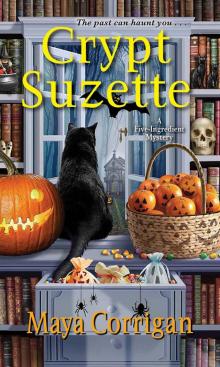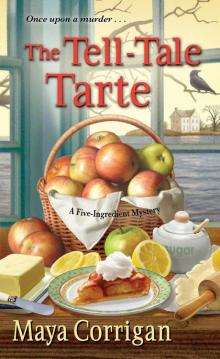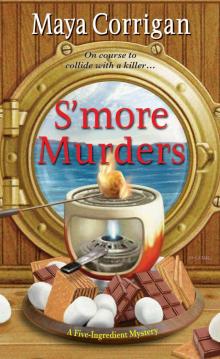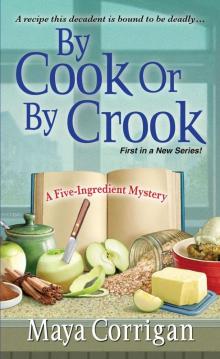- Home
- Maya Corrigan
By Cook or by Crook Page 2
By Cook or by Crook Read online
Page 2
Val picked at loose threads on the sofa arm. “I just want to know what happened. I need the truth.”
“You store a lot in your noggin. Recipe ingredients, movie plots, bits of trivia. They pop out when you need them. That night you had a concussion. It’s not your fault you can’t remember.”
“I know.” But the accident might have been her fault. With no memory of what led to it, Val didn’t know if her anger had turned destructive. Could she have crashed the car deliberately, as the man riding with her claimed? That night had tested her character. After five months she still didn’t know if she’d passed or failed.
“Take my advice, Val, and let it go.” Granddad squeezed her hand. “How was your game tonight? Did they pair you with a geezer again?”
The change of subject brought Val out of her funk. “This time I had a younger partner, in his thirties. He works in D.C. and is looking for a weekend place. Gunnar Swensen.”
“Scandinavian?”
“Possibly, but mixed with Latin blood. Thick dark hair, bluish eyes.” Plus rugged features and a crooked nose. But a megawatt smile transformed his face from almost a train wreck to almost attractive. “He’s pretty buff for someone who works in an office. His tennis isn’t bad, and he wants to play me in singles.”
Granddad’s eyebrows rose, furry white squiggles in his forehead. “Gonna whup him?”
“Gonna try. Tennis gives a short player like me a fighting chance against a taller, stronger one. That’s why I like it.”
“Losing to a small woman—that’ll test his mettle.” Granddad laughed.
“Tony couldn’t handle it.” Her ex-fiancé used to sulk whenever he lost to her.
Granddad covered his ears. “No more about Tony. You need to get over the past.”
Ironic advice from a man nursing a grudge against a long-dead nephew. Val stood up. “Okay, I’ll focus on the future. Tomorrow evening I have to work on a catering menu. Just heat up tonight’s leftovers for yourself, and I’ll scrounge around for snacks.”
“Leftovers. Hmph. That’s the best you can do for your grandfather?”
“You can always cook up something yourself. My recipe file is your recipe file.”
“If I burn the place down, it’s all on you.” He aimed his remote at the TV.
Early Tuesday Val parked in front of Nadia’s Cape Cod, bleary-eyed from a late night. Describing and pricing the mouthwatering dishes she could prepare for the club party had taken longer than expected. She walked past Nadia’s Lexus in the driveway and glanced at the bed of river rock where the racket had burned. A good rain would wash away any trace of the fire. No rain in today’s forecast though. No cool breeze off the bay either. The creek behind the house had barely a ripple, and Nadia’s kayak sat motionless next to her dock.
Val climbed the porch steps and rang the bell twice. She pounded on the door. No answer. Nadia wasn’t the type to oversleep or forget an appointment. Unlikely a woman in her forties would have a heart attack, but maybe she’d fallen and hit her head. Val tried the knob. It turned.
She poked her head into the hall. “Nadia?” No answer. “Anybody home?” she shouted up the stairs. Again, only silence.
She walked toward the back of the house, the floorboards creaking with each step. She froze at the entrance to the kitchen.
Nadia lay on the floor. An alabaster doll with open eyes. A wood tennis racket stuck out of the base of her throat, its shaved handle like a spear, the racket head listing to one side.
Chapter 2
Val felt her throat close. Her knees gave way. She grabbed the door frame, breathed deeply, and tried to stay upright.
Her head cleared. She could do nothing for Nadia. The bluish skin tone, the congealed blood—Val had seen enough crime shows to know what that meant. Nadia had been dead for hours. Murdered. What if the murderer was still here? No, of course no one was here. Why would the murderer stay around waiting to be caught?
She had to get help. She rummaged in her tote bag. No cell phone. She staggered back to the hall with tears clouding her vision. A desk phone sat on the hall table, but she shouldn’t touch anything at a crime scene. She used her car key to punch the Speaker button and 911.
Words caught in her throat when the dispatcher answered. She forced them out. “Val Deniston calling from 156 Creek Road. I found Nadia Westrin dead here. Murdered.”
“Murdered?” The dispatcher sounded skeptical. She barraged Val with questions and then gave advice. “You should go outside and wait for the police. Go to a neighbor’s house if you’ll feel safer there.”
Walk away? Maybe mess up the murderer’s fingerprints on the way out? Even if she turned the doorknob with a tissue in her hand, she might smudge some prints.
“Ma’am, are you still there? Can you call me back on a cell phone once you’re outside?”
“I don’t have a cell phone with me.” She must have left it on her nightstand. “How long before the police get here?”
“They’ll be there as soon as possible. Don’t touch anything.”
The dispatcher clicked off, leaving Val to weigh the conflicting advice. Go outside, but don’t touch anything. She debated a moment. She felt safe in the house, and it didn’t seem right to leave Nadia alone.
Val inched back to the kitchen doorway. If she looked no farther than Nadia’s bare feet and bright red toenails, her tanned legs and black Bermuda shorts, she’d think Nadia was resting. Val closed her eyes and bowed her head. Rest in peace.
When she opened her eyes, anger surged through her like an electric current. No one should die like this. Nadia would have been just as dead if someone had stabbed her with a knife. Plenty of knives in a kitchen. Why take the time to turn a racket into a lethal weapon? To mock Nadia’s passion for the game? She’d reveled in competition and fought hardest when she was behind in a match. No sign of a struggle here, nothing out of place in the kitchen and the screened porch beyond it.
Next to the doorway where Val stood, wineglasses hung from a stemware rack lined up like troops for inspection. The front two didn’t pass muster. Unlike their sparkling comrades, they had water spots suggesting a hasty washing. Crumbs and smears marred the counter between the stemware rack and the fridge. Across the room, though, the granite counter near the sink gleamed. Someone had cleaned half the kitchen.
Less than a month ago, at Nadia’s Memorial Day party, food and drinks covered the countertops, and guests from the club, her real estate office, and the neighborhood filled the small house. Had one of them murdered her? No stranger had killed Nadia. The weapon hinted at a grudge against her.
Val’s stomach knotted. Monique had a big grudge and would be a suspect. Val had to warn her. Better for her cousin to hear about the murder from her than from the police.
She rushed to the hall and then fidgeted in front of the phone. Should she use it? The police would trace calls on this line. They’d wonder why she’d phoned her cousin from the murder scene. The call would have to wait.
She studied the jottings on the notepad near the phone. Nadia’s abbreviations, cramped writing, and lack of punctuation made it hard to tell where one word ended and the next began. ZACHARNAROVIAK appeared at the top of the page, then a line that read 56MAPLE BRK 3BR 2BA RANCH FP FNCD YD Tues430. A phone number followed, then a solid line halfway across the page, and six letters—F O R S A L.
Val knew enough real estate shorthand to decipher the notes. Someone with a long last name and a brick house on Maple Street had made an appointment with Nadia for this afternoon at four-thirty. Nadia had taken down the client’s phone number and the property details. Maybe she’d started composing a For Sale ad, but something—or someone—interrupted her. Now she’d never finish that ad or meet that client.
From the hallway Val peered into the living room. Nadia’s tennis trophies sat on the mantel. A tall curio cabinet held her collection of miniature buildings. One shelf had a display of houses common on Maryland’s Eastern Shore, including a modest Cape C
od like Nadia’s and a Queen Anne Victorian like Granddad’s. Another shelf held tiny half-timbered cottages and adobe haciendas. A miniature brownstone reminded Val of the place where she and two college classmates had rented an apartment when they first arrived in New York a decade ago. Now the other two women were married with children, living in the suburbs, and she’d moved even farther from the city.
A siren wailed. Police at last. Val parked herself by the front door.
The sidelight gave her a view of a ruddy man coming up the walk—Chief Yardley, the new head of the Bayport police and her grandfather’s friend. The chief reminded her of a gingerbread man, his round head on a barrel-chested frame, his neck barely visible.
He opened the door with a latex-gloved hand. “What’s going on, Val? Where’s—?”
“The kitchen.” She pointed toward the back of the house.
“Stay here. Leave the door open. The EMTs are right behind us.” The chief lumbered down the hall, followed by a uniformed officer young enough to work undercover at a high school.
“Omigod!” The young cop’s voice carried into the hall.
Two husky paramedics rushed in. Val waved them toward the kitchen.
Voices came from the back of the house, but only the chief’s words carried. “You can’t do much here, boys. I called the medical examiner. This here beats anything I ever seen.”
Val wondered how many murders Earl Yardley had investigated in his career. He’d worked as a detective in various Maryland jurisdictions and only recently taken over as chief in Bayport. He probably hadn’t expected a murder in a tourist town with a few thousand year-round residents.
The chief returned to the hall with the rookie cop and snapped his cell phone closed. “Nadia Westrin. Her name’s on lots of real estate signs. Friend of yours, Val?”
“I know her from tennis at the club. She asked me to meet her here to talk about the menu for a club party. I rang the bell a few times. With her car in the driveway, I figured she had to be home. I tried the knob, went in, and found . . .” Val relived the shock of her first glimpse of Nadia dead and felt dizzy again.
“Hey, you look shook up.” The chief pointed to the staircase leading to the second story. “Sit on the steps. Put your head between your knees.” He summoned the EMTs from the kitchen.
By the time they finished taking her pulse and her blood pressure, she felt steady again. They insisted she stay seated and made her drink water.
“You ready to answer some questions, Val?” At her nod, the chief pointed to the notebook in the rookie cop’s hands. “What are you scribbling?”
“The details, sir. The victim is a white female, middle-aged—”
“Middle age is a moving target, son.” The chief looked down at Val. “What all do you know about her? Age, marital status, anything else?”
“Early forties. Divorced. No children.” As for her affair with Monique’s husband, the police would have to discover that without Val’s help. “Nadia’s ex-husband, Joe Westrin, moved from Bayport, but he lives somewhere around here, maybe Treadwell. He still comes to the club to work out.”
The chief stroked his chin. “Hard feelings between them?”
“The few times I saw him talking to Nadia at the club, they looked civil enough.” Most divorces, though, left hard feelings.
“What about the racket that’s stuck in her? Does it belong to her?”
“It’s not the racket she played with. She had the latest equipment. Wood rackets are antiques.”
“When was the last time you saw her?”
“Sunday night.” Over a burning racket. Hard not to view that ugly incident as a prelude to the murder. Val shifted her position on the step and raked the carpet with her fingers. “Let me tell you what happened that night.”
Officer Wade gaped at her description of the burning racket.
The chief grimaced. “How come I didn’t hear about this?”
“It wasn’t much of a fire. A garden hose took care of it. And Nadia didn’t want to notify the police.” Not a wise decision in retrospect. “When we pulled the charred racket out of the ground, we saw that the handle had been whittled to a point turning it into a stake.”
The chief gestured with his thumb toward the kitchen. “Like the racket out there.”
“I can search the premises for the burned racket, Chief,” Officer Wade said.
“Folks with more crime scene experience will do that. I need you to take down Ms. Deniston’s information. Val, I want you to tell Officer Wade everything that happened this morning and the night of the fire. And give him the names of the victim’s pals at the racket club.”
A bearded man arrived with a medical bag. The chief went back to the kitchen with him.
While Val talked to Officer Wade, people filed by. The EMTs went out. Crime scene technicians came in with cases and cameras.
The chief ambled back into the hall. “What were you doing last night, Val?”
She didn’t need to ask when Nadia had died. The chief’s question made that clear. “I was home with Granddad.” Though they’d barely seen each other.
While she’d worked on her catering proposal upstairs, he’d watched videos and gone to bed downstairs. She could have left the house by the back staircase, and he wouldn’t have missed her. Her parents could confirm she’d answered the house phone at nine. By now, though, they were sailing on the high seas, taking their boat to the Bahamas. Val didn’t expect to hear from them until the weekend.
“Oh my gosh.” She rubbed her temples. “I just remembered something. Nadia called yesterday around five and left a message for me.”
“What about?” the chief asked.
“She confirmed our meeting this morning and asked me to call her. That’s all. I’d turned off my phone to concentrate on something and didn’t hear her message until late last night. I expected to see her this morning, so I didn’t bother returning the call.” She sighed. “I wish now I’d called her back.”
“Don’t beat yourself up over it. Any idea who did this?”
She shook her head. “You’d better ask people who’ve known her longer.”
The chief checked the officer’s notes, nodded his approval, and returned to the kitchen.
Officer Wade closed his notebook when she finished giving her statement and smiled at her. “You friends with the chief? He don’t usually call people by their first name.”
“I’ve known him since I was about this high.” She held her hand three feet from the floor. “His father and my granddad were good friends. The chief’s father died young. Granddad stayed in touch with the family and did guy things with the chief—fishing, Orioles games.”
“Did you grow up in Bayport?”
“No, I’m a Navy brat. We never lived long any place my father was stationed. This was the closest thing to home I had. I spent summers here with my grandparents until I was sixteen.” During two of those summers, Monique had also visited Bayport. They’d come to know each other, despite the feud between two branches of the family. What adolescent can resist a forbidden friendship? “After that, I only made short visits here.”
“But you live in Bayport now?”
“Only since January.”
The door burst open. A man with a shaved head strutted into the hall. He had a pale and puffy face, like risen dough that needs a punch. His shaved head made his other features more prominent—eagle eyes and curiously small ears for a man with such a big head.
“Deputy Holtzman from the sheriff’s office.” He spoke as if introducing himself to a large gathering. “Where’s your chief?”
Officer Wade squared his shoulders. “In the kitchen, sir.” He nodded toward the back of the house.
Holtzman pointed at Val. “Who are you?”
She stood up. “I’m Val Deniston.”
“She found the victim and called us.” Officer Wade waved his notebook. “I just took her statement.”
Holtzman scrutinized her from top to toe as if
sizing her up for a prison jumpsuit. Somewhere she’d read that the person who reports a crime is always the initial suspect. The deputy stopped staring at her as the chief came into the hall.
“Ah, Holtzman. Glad you got here fast. I see you’ve met Ms. Deniston.” The chief turned to Officer Wade. “Go out to the street and shoo those nosy neighbors away. I don’t want them to see Ms. Deniston leaving. If folks don’t know she was here, they can’t pester her about what she saw. Once she’s gone, you go back to the station and type up what she told you.”
“Yes, sir.” The officer left.
“Val, can you stop by the station later this morning? We’ll go over the information you gave us and see if you want to add anything.”
“I’ll be there.” Even if it meant closing the café for a while.
The chief hustled Val up the driveway. “Don’t go around telling folks what you saw here. The story we’ll give the press is that the victim died of a sharp force injury. In other words, she was stabbed, but we’re not telling what the weapon was. Understand?”
“I won’t say a word about the racket.” Hard to believe the police could keep that detail secret. “Did you find the burned racket?”
“In the trash bin. Lucky for us the garbage collection on this street isn’t until tomorrow.” He hovered over her until she climbed into her car. “Give your granddaddy my regards.”
“I will. Who’s in charge of a case like this? The Bayport police or the sheriff’s office?”
“We take the lead, but we don’t have the manpower to investigate major crimes. I get resources from the sheriff’s department to conduct interviews. The crime scene unit comes from the state police. We all cooperate on a big case like this.”
Good. The sheriff’s deputy wouldn’t be taking over. Val broke the speed limit in her rush to get home.
A faint burning smell hit her when she opened the side door to the house. Nothing new. Granddad liked his toast crispy and sometimes overshot the mark. The house reeked of his blackened bread at least once a week.
She went into the front room. The former “courting parlor” now served as a study. She’d brightened it up with three coats of lemon paint to set off the chocolate brown woodwork.

 Scam Chowder
Scam Chowder Gingerdead Man
Gingerdead Man Crypt Suzette
Crypt Suzette The Tell-Tale Tarte
The Tell-Tale Tarte S'more Murders
S'more Murders By Cook or by Crook
By Cook or by Crook Final Fondue (A Five-Ingredient Mystery)
Final Fondue (A Five-Ingredient Mystery)